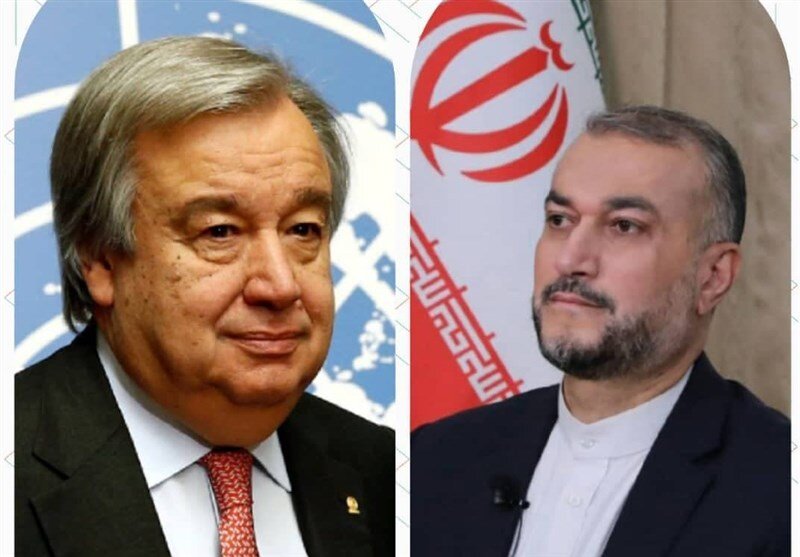Iran has entered Vienna talks in good faith, Iran FM tells UN chief

TEHRAN – Iranian Foreign Minister Hossein Amir Abdollahian and UN Secretary General António Guterres have held talks over the phone about regional and international issues including the developments in Afghanistan and the nuclear talks in Vienna.
The phone conversation came after Iran and the P4+1 group of countries – Russia, China, France and the UK plus Germany – resumed the Vienna talks on how to remove U.S. sanctions on Iran after a months-long hiatus.
Amir Abdollahian reiterated in the telephone call that despite the violation and inaction of the U.S. and the European troika, Tehran has attended the Vienna talks in good faith and is trying to reach a good agreement, according to the Iranian foreign ministry.
The Iranian foreign minister enumerated the characteristics of a good deal, saying the other side must return to full compliance with its obligations under the 2015 nuclear deal, the Joint Comprehensive Plan of Action (JCPOA). He said in that case, the Islamic Republic of Iran will reverse its remedial measures. Amir Abdollahian added that the key point is that any resulting deal must be effectively verifiable.
The top Iranian diplomat went on to refer to the constructive and progressing talks between the director of the Atomic Energy Organization of Iran and Director General of the International Atomic Energy Agency Rafael Grossi, saying Tehran will continue its technical cooperation with the IAEA.
Regarding the 6 previous rounds of talks, Amir Abdollahian pointed out, “We will not ignore the negotiations, but as a new administration, we reserve the right to review the disputed issues and discuss them in light of our own considerations.”
Antonio Guterres also welcomed the start of the new round of talks and threw his full support behind the full revival of the JCPOA. The UN chief also expressed hope that the talks will produce results.
Guterres also described Iran’s demand for a verification of removal of sanctions as reasonable.
The UN secretary general said it is necessary that all sides make efforts to take confidence-building measures and reaffirmed the UN’s full support.
Amir Abdollahian also spoke with the UN chief regarding the Afghanistan issues.
Amir Abdollahian underlined the need for the formation of an inclusive government in Afghanistan and described the dangerous humanitarian situation on the eve of the cold season as worrisome. He cited the existence of the refugee crisis, the freezing of the Afghan financial resources, and Daesh’s acts of terrorism as crisis factors in Afghanistan.
Antonio Guterres voiced concern over the profound crisis, particularly the humanitarian crisis in Afghanistan and underlined the necessity of a cash injection into the economy of the country.
The world’s top diplomat said the UN is making an effort to set up an international monetary fund with the help of the World Bank and several countries with the aim of creating a mechanism for cash injection into the Afghan economy despite the sanctions.
The opening session of the talks aimed at lifting anti-Iran sanctions was held on Monday evening in Vienna.
During the negotiations chaired by Ali Bagheri, head of the Iranian Delegation, and Enrique Mora, the EU deputy foreign policy chief, the Iranian diplomat outlined the position of the Islamic Republic of Iran.
Bagheri stressed the need to lift all inhumane and coercive U.S. sanctions against the Iranian people, saying the lifting of sanctions must be the top priority in the talks.
While noting that the Islamic Republic has demonstrated its adherence to its obligations in practice, the head of the Iranian delegation stressed Tehran’s determination to reach a just understanding that serves the legitimate interests of Iran.
Bagheri also spoke of claims by some Western parties about the revival of the Iran nuclear deal, JCPOA. He stressed that a revival of the JCPOA is nothing more than an exaggeration as long as the U.S. campaign of “maximum pressure” is alive.
The lead Iranian negotiator also commemorated the anniversary of the martyrdom of Iranian nuclear scientists Mahmoud Shahriari and Mohsen Fakhrizadeh and honored the memory of all the martyrs of Iran's nuclear program.
During the talks, which were held in a professional and serious atmosphere, it was agreed that the meeting of the working group for the lifting of sanctions be held on Tuesday morning.
After the meeting, presidents of Iran and France held a lengthy telephone conversation during which they discussed the Vienna talks in detail.
During the call, Iranian President Ayatollah Seyyed Ebrahim Raisi said, “Iran has always adhered to its commitments on the nuclear issue and the International Atomic Energy Agency has repeatedly confirmed Iran's adherence.”
Ayatollah Raisi stressed, “The current situation is the result of the Americans and Europeans not fulfilling their obligations in the JCPOA.”
He added, “If the Americans lift the sanctions and the Europeans live up to their commitments, do not worry about fulfilling Iran's commitments. Because we have shown many times in practice that we are committed to our commitments.”
French President Emanuel Macron, for his part, condemned the U.S. withdrawal from the JCPOA and said, “We consider the JCPOA our common responsibility and I have always tried to get all parties back to the deal framework.”
Macron added, “I have had talks with U.S. President Biden in this regard and we are determined to continue the talks to reach a result.”
In the end, the French president pointed out that “France wants to continue talks with Iran to make progress in resolving issues.”
Leave a Comment